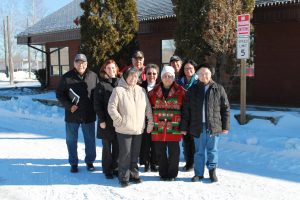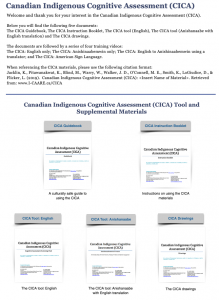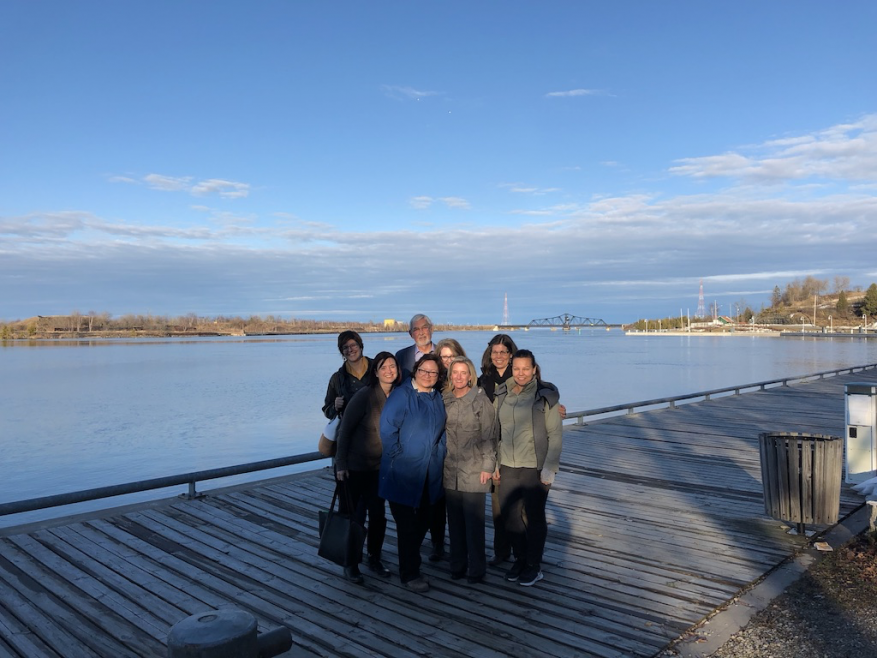The Canadian Indigenous Cognitive Assessment (CICA) is an adapted version of the Kimberly Indigenous Cognitive Assessment, developed by researchers at the Western Australia Centre for Health and Aging. The adapted CICA tool is an outcome of the CCNA Phase I – Team 20 program of research, and the project was led by Dr. Kristen Jacklin.
The idea for this tool arose nine years ago. According to Dr. Jacklin:
Interest in developing or adapting a culturally fair cognitive assessment was first identified by First Nations communities collaborating in our research studies in 2010. A Canadian Institutes of Health Research (CIHR) planning grant awarded in 2013 allowed us to initiate the work. While it has taken many years to accomplish the careful process we undertook, this gives me confidence that the CICA, along with the training materials we have developed, will provide a culturally safe experience for older Indigenous people who are in need of assessment.
Dr. Jacklin stresses that the development of the CICA followed community-based research principles and has only been possible through the inclusion of Indigenous knowledge shared by the Anishinaabe on Manitoulin Island:
The adaptation was conducted in partnership with First Nations on Manitoulin Island and its success is owed to our diverse team, but particularly the knowledge and dedication of the Anishinaabe Language Advisors, the local research advisory group, and our Community Researcher, Karen Pitawanakwat.
Mrs. Pitawanakwat highlights the need this tool fulfills:
Historically many western health care providers describe Indigenous persons as “poor historians” or “stoic” in health care related interactions and there is a real lack of meaningful informed health care information that is described in a way that we understand. This tool was developed using our language, our knowledge, and the way that we understand the world we live in today. It takes into account our colonial experiences and asks testing questions in a safe appropriate way and meets our distinct needs when it comes to assessing cognition. This is one of many steps into a future world where we bridge worlds of knowledge to support people and their families who are living with dementia.
The CICA has been validated with Anishinaabek on Manitoulin Island, Ontario (J. Walker CIHR Operating Grant). The results of the validation were recently shared at the Canadian Conference on Dementia. Drs. Jacklin and Jennifer Walker are currently working on peer reviewed publications to share the process of the adaptation and the results of the validation.
Important research on the CICA continues in CCNA Phase II under the direction of Dr. Walker, lead of Team 18 (Issues in Dementia Care for Indigenous Peoples). In Phase II, Dr. Walker and her team will be implementing the CICA on Manitoulin Island, Ontario and elsewhere. This involves face-to-face training for the participating communities on Manitoulin and training evaluation studies.
The CICA has also been adapted and translated into Nakota in Saskatchewan, and an urban version of the CICA was developed in Calgary, Alberta. Both of these will be validated and released in the next year.
Dr. Walker summarizes the importance of this achievement:
The CICA will be a major contribution to Indigenous dementia care in Canada. It highlights the strengths of community-centered, community-guided research. This launch is an exciting first step in the ongoing work of Indigenous communities across Canada who are adapting, translating and validating the CICA, including the File Hills Qu’appelle Tribal Council in Saskatchewan and the diverse urban Indigenous community in Calgary. I am excited to look forward and see the impact that the CICA will make on dementia care for older Indigenous people.
The CICA toolkit can be accessed here and includes the following:
- CICA Guidebook (a culturally safe guide to using the CICA)
- CICA Instruction Manual
- CICA Screening Tool – English [PDF fillable]
- CICA Screening Tool – Anishinaabe with English translation [PDF fillable]
- CICA Drawings
Four CICA Training Videos are also available:
- English only
- Anishinaabemwin only
- English to Anishinaabemwin (using a translator)
- American Sign Language
Featured image: The CICA validation team on Manitoulin Island. Back Row: Loise Jones; Dr. Christopher Patterson; Rosanna Pietrangeli Dr. Cheryl Allaby; front row: Melissa Blind; Karen Pitawanakwat; Kristen Jacklin; and Sharlene Webkamigad.



